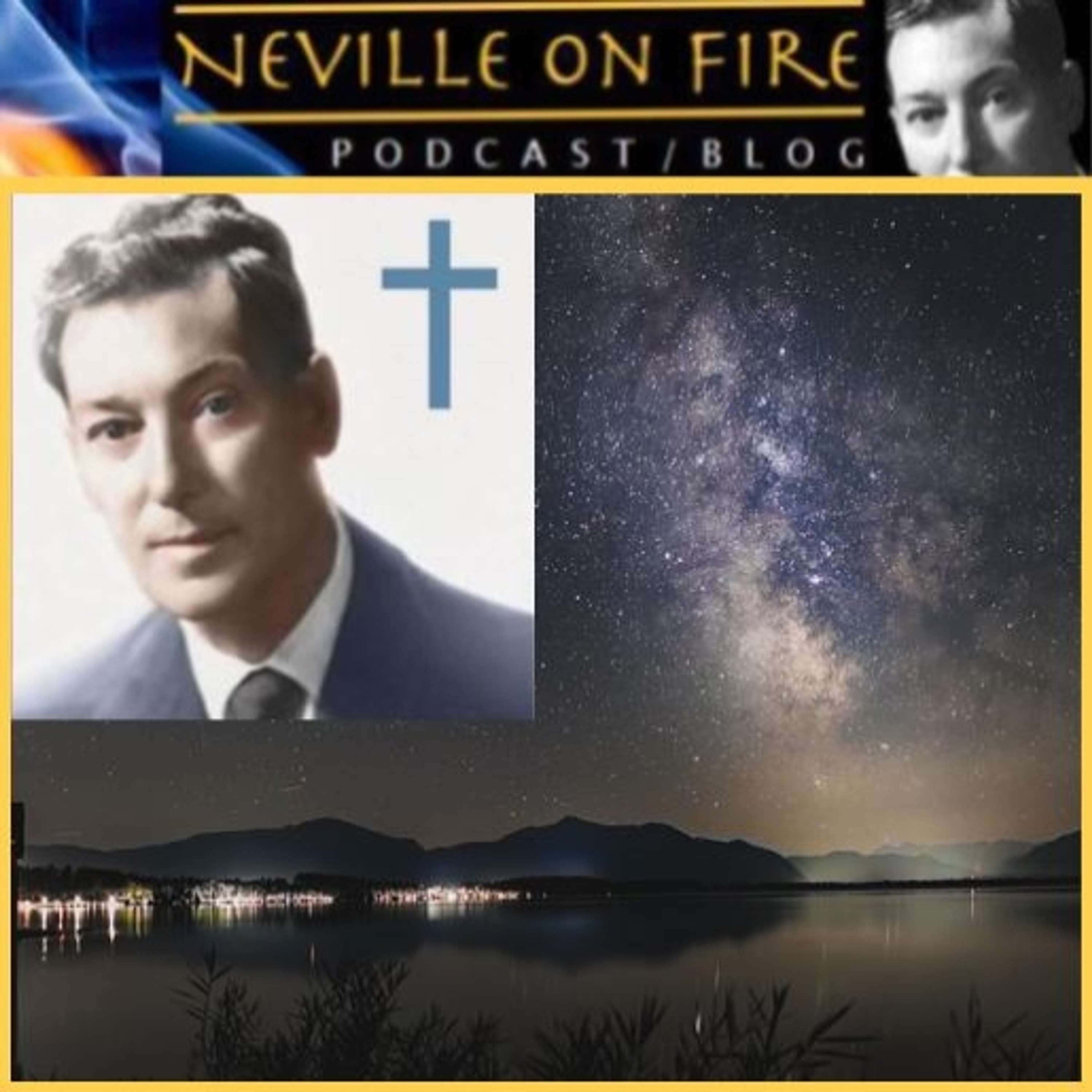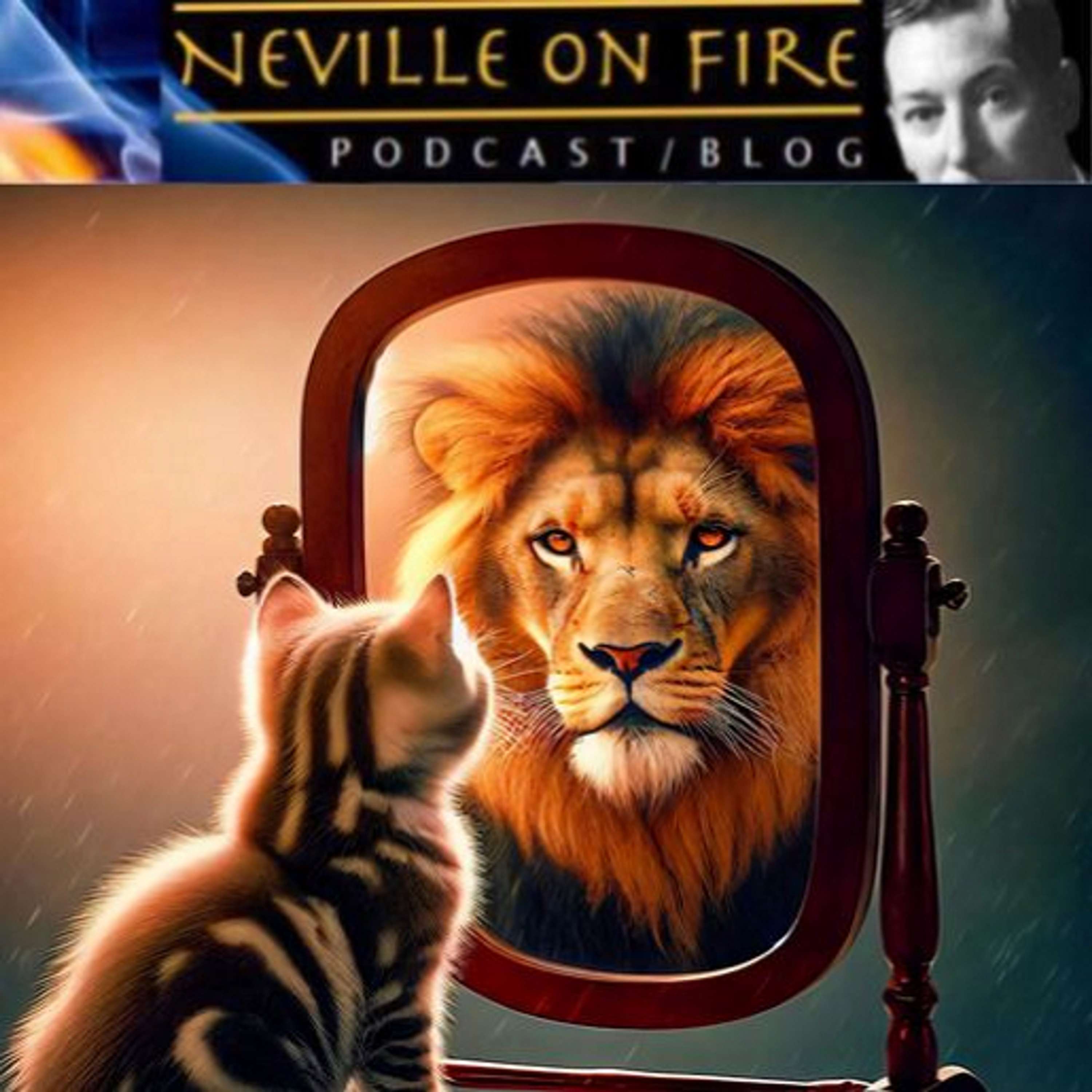Show Notes
1. Dominant narratives as hypnotic programs, and our own mental sovereignty.
2. Mass hypnotic sleep -- society.
3. Hypnotic sleep -- on an individual basis.
4. Authors in field of hypnosis, self-hypnosis, autohypnosis: no idea of true consciousness.
5. By contrast: GI Gurdjieff, Dr. R. Alexander and Neville: all hold a distinct concept of consciousness and are acutely aware of mass hypnosis used in society.
6. What characterizes programs of institutional mass hypnosis and mass psychosis?
7. Self-hypnosis, autosuggestion, affirmations -- used constructively to realize abundant life.
8. Key difference in technique: use true conscious faculty, instead of surface-level readjustments.
9. Recap: mass hypnotic control programs vs the acquisition of consciousness to achieve aims and even affect society at large.
10. What is hypnosis really all about? How does it fit into Neville’s world view?
Summary: Consider conscious use of self-persuasion. The extraordinary effects demonstrated by the phenomenon of hypnosis are dependent on belief systems. Knowing this, we release ourselves from dominant institutional narratives and realize more fully our freedom of choice.
KEY QUOTE
"At the present time most of us pass our lives in a state of hypnotic trance... To escape from the slavery imposed by our subconsciousness we must become conscious.” Alexander, Dr. Rolf (1956) Creative Realism
RESOURCES
Chomsky, N and Herman, E (1988) Manufacturing Consent: The Political Economy of the Mass Media
Tripp, James (2021) Hypnosis Without Trance
Note: not recommended for our purposes, as it is mostly a treatise on how to control others.
Two particularly good examples of standard literature on self-hypnosis (within the limitations discussed).
Pulos, L. (1994) The Power of Visualization (audio series)
All else by Pulos also recommended.
Maltz, M. (1960) Psycho-Cybernetics
Mentioned:
P. Yogananda (1946) Autobiography of a Yogi
Repeated:
Ouspensky, P.D. (1949) In Search of the Miraculous
Alexander, Dr. Rolf (1956) Creative Realism
Show Transcript
This is E12, Hypnosis vs Conscious Self Persuasion.
1. Dominant narratives as hypnotic programs, and our own mental sovereignty.
I feel the topic of today's episode is especially timely. You might have noticed that the dominating narrative in the popular media has actually subsided, and has been replaced now with a new dominating narrative, as the first one is losing credibility in the eyes of the public.
This is a familiar pattern. It brings right to the fore the question of the degree to which we have control over our own mental sovereignty, our own belief systems, our own individuality, and our own lives.
The idea of a dominant narrative, of course, was exposed in a book as far back as 1988 called Manufacturing Consent. In this episode, I'm going to discuss a series of related concepts:
· hypnosis
· mass hypnosis
· mind control
· autohypnosis
· self-suggestion
· self-persuasion
...and then how these relate to affirmations, as we've been discussing them, and our exploration of Neville's ideas.
2. Mass hypnotic sleep -- society.
So first of all, let's talk about this notion of society at large and (individuals -- as a result) being in a state of sleep, and it's characterized as hypnotic sleep. Does Neville have this idea? Well, he doesn't go into it in depth, at least not in any discussion that I'm aware of. But he does make several references to this person or that person being “sound, sound asleep”. And in this connection, one of his students related an incident where she was having an interaction with her husband, and saw by the look in his eye that he was saying to her, sort of subconsciously, ‘I'm in a profound sleep and don't you dare try to wake me’, which goes really to the heart of the matter that I'm trying to express here.
I often refer to Fourth Way literature, and I'll do so again. Now, the book In Search of the Miraculous, in the discussion between the author and Gurdjieff, the guy who brought the system of knowledge from the East to the West in the early part of the century, was in Moscow back in, I guess, around 1915. In their first discussion, Gurdjieff explained to him that people -- sitting at a cafe, generally speaking, people at large, walking along the street and so on and having discussions -- are in such a state of sleep that they forget themselves. They become the political argument, they become the vociferous emotional argument and lose all trace of themselves, psychologically.
In fact, he's so categorical in his description of humanity at large, saying that people are simply machines. So when the author Ouspensky tries to object to this, saying that there are different types of people, different orientations of people's individual psychology that can be more awake -- they can be artists and writers, and so on, Gurdjieff rejects the whole thing entirely and says, no, what each of these persons is that you're describing, they are as a result of their own mechanicalness. They're not exercising conscious choice.
Well, eventually the whole thing develops as the students who are studying with Gurdjieff try to put into practice his admonitions to observe themselves and study themselves throughout the course of the day. They come back reporting their results. And Gurdjieff says, well, you've missed the most important thing. You missed the fact that you didn't remember yourself, you weren't consciously aware of yourself in the moment, you forgot yourself throughout all of these observations. So the whole thing was carried out in sort of a mechanical fashion in other contexts. The same teacher talks about results that you might get, but then he denigrates them as “merely” self hypnosis, “merely” self suggestion -- which is interesting. Gurdjieff himself, before he embarked on this career that we're reading about, had been a hypnotist. That was his profession. So he understood hypnosis profoundly.
Gurdjieff deplores the fact that humanity at large is in a state of hypnotic sleep. Equally, he deplores the fact that his students might be going out during the day and carrying out an exercise in self observation and yet forgetting themselves the whole time. And equally, he deplores the idea of employing self suggestion, self hypnosis, autohypnosis, undertaken in a mechanical way without invoking self consciousness, merely vain repetition.
Is Gurdjieff correct in his assessment of society at large, and is he correct in his assessment of people who are trying to take control of their own well being by using mental assertions and affirmations and self suggestion, and yet doing so in a rather mechanical and unconscious way?
3. Hypnotic sleep -- on an individual basis.
Well, I've got a small library of books on auto hypnosis, self hypnosis, which had quite a run back in the 70s. I don't think it's an exaggeration to say that those authors were unaware of and ignore the idea of consciousness as Gurdjieff was discussing it, and simply perpetuate the popular notion of consciousness, which is “conscious thinking”. Well, the idea of conscious thinking is a contradiction in terms, and I'm following here the writing of Rolf Alexander, whom I quoted back in E1. Alexander himself also deplores the idea that so many people can be drawn, millions of people can be drawn, by propaganda and basically mass hypnosis into war, for example.
4. Authors in field of hypnosis, self-hypnosis, autohypnosis: no idea of true consciousness.
If we compare his program of auto hypnosis with that of:
· Baudoin (Suggestion et autosuggestion)
· Lee Pulos (Beyond Hypnosis) -- Great author, by the way, but still in the same camp as, let's say,
· Peter Blythe
· Leslie Lecron
· Melvin Powers
· Terry Robbe and Carl Shanzer, and even the great
· Maxwell Maltz (Psycho Cybernetics).
...of course, you can benefit from the material that these authors have written...
5. By contrast: GI Gurdjieff, Dr. R. Alexander and Neville: all hold a distinct concept of consciousness and are acutely aware of mass hypnosis used in society.
But my point is that it's Alexander and Gurdjieff who set themselves apart by pointing to an experience of consciousness that is a very specific and vivid practice of self awareness. You have to be taught it; it has to be received by instruction. I think it's right to point to the fact that each of these sources, Rolf Alexander and Gurdjieff, are drawing on what we can call an esoteric tradition. Each of them characterizes people in their habitual state as being in a state of sleep, and each one insists on self remembering, self consciousness, coming to awareness of being -- just as Neville does in, for example, the book called At Your Command.
So you might be thinking of a counter argument here along the lines of, ‘Well, Gurdjieff, after all, was speaking back in 1915, and Rolf Alexander himself was publishing in the mid 1950s. These guys are out of date. Why don't you check something more modern?’
So as sort of a spot check, I ordered Hypnosis Without Trance by James Tripp, published in 2021. The author says, and here he’s quoting: “People don't have perceptual access to any type of objective reality, only a subjective reality shaped by a belief system.” Well, that's in the first chapter and in the entire rest of the book, I could not find any reference to the idea of actually coming to conscious awareness of being.
By stark contrast, Rolf Alexander is counselling us to work towards objective consciousness and live in the real world, and perceive actual reality.
So, in summarizing, what I've covered so far in the first half of this episode, I think we could see that the authors who are truly concerned with objective self awareness are also acutely aware of the problem of mass hypnosis mass psychosis, where whole populations are captured and swayed by propaganda systems.
So Neville in his admonition not to take all of the newspaper headlines at face value, but to have a disciplined denial of that which you do not desire... This thread connects him with Rolf Alexander, who is admonishing people to come to objective self awareness, as well as to the message of Gurdjieff. All of these sources are concerned with individual conscious development, both for personal development and for the sake of humanity as a whole.
6. What characterizes programs of institutional mass hypnosis and mass psychosis?
This discussion connects back to the challenges of freeing oneself from the harmful effects of institutions, as we were discussing in E3. What characterizes these mass programs of hypnosis, and even mass psychosis, and induces people to submit to fear, and leave behind common sense?
Well, any survey of the history of the authorities that have tried to investigate and control mind control methods shows that these authorities, whether in the East or in the West, have discovered the truisms: that it depends on inducing the feeling of debilitation, dependency, and fear itself -- and most particularly isolation. So ask yourself, how have these things been used in the most recent dominant narrative?
7. Self-hypnosis, autosuggestion, affirmations -- used constructively to realize abundant life.
Well, let's turn our attention now to self hypnosis, auto, hypnosis, self suggestion, and affirmations -- in such a way that we can extricate ourselves from this nightmare of institutional control, and at the same time realize the life we should be living that is free, prosperous, creative, intelligent, enlightened -- as much in our personal lives as in society at large.
We've already seen that we don't want to be subject to hypnotic programming, whether that is on the scale of global agendas, or even doing [personal] affirmations and self suggestion in a way that does not incorporate conscious awareness of being. So self remembering -- self-realization along the lines of the exercise that I had suggested in E1, -- is paramount.
From there, we don't want to be subject to hypnosis, especially heterohypnosis, where we put ourselves in subjection to someone else's consciousness, but we don't want to throw out the idea altogether of using affirmations, using repetition, using recapitulation, using self suggestion.
8. Key difference in technique: use true conscious faculty, instead of surface-level readjustments.
And this leads to the very subtle point that is arrived at in Rolf Alexander's book, where you're dividing yourself in two: you have a conscious faculty, pure awareness of being which is, in the moment of the exercise, subjecting the rest of you, so to speak (i.e., the subconscious) to deliberately selected affirmations and directions.
So you might well ask, what's the difference between doing that and simply following the instructions of any of those authors that I had mentioned before? So, for example, Lee Pulos, who talks about visualization and even the whole brain, sensory method of visualization, which is very much akin to appropriating the state of the wish fulfilled, as Neville recommends... or even Maxwell Maltz, in his famous book Psycho Cybernetics.
Well, the key difference, as I keep insisting, is instead of the ordinary auto hypnosis and self suggestion, we're trying to employ conscious self persuasion. We're trying to develop the conscious faculty, in service of a consciously conceived aim, and thereby not to pursue just surface level readjustments, but to effect a whole radical change.
It seems clear that in the progression of desires that Neville explains, he's aiming towards an ultimate radical reconstitution of the person's psyche, a reorientation towards the divine. And it's the same thing with Gurdjieff. He's not after a simple readjustment at the surface level, he wants conscious evolution. And same thing with Alexander. Rolf Alexander says, “At the present time, most of us pass our lives in a state of hypnotic trance. To escape the slavery imposed by our subconsciousness, we must become conscious. There's no escape from sleep, save through awakening. This may be accomplished through a natural process of self-evolution.”
9. Recap: mass hypnotic control programs vs the acquisition of consciousness to achieve aims and even affect society at large.
Well, so far we've been discussing mass hypnotic sleep seen at the societal level and induced by institutional programs, global agendas, dominant narratives. We also discussed, at the level of individual study, that we really want to incorporate the practice of awareness of being into any exercise of recapitulation, affirmation, prayer, self suggestion, self hypnosis.
I think that is the distinguishing feature of Neville and similar thinkers from the rest of the whole self help movement. That acquisition of awareness of being, that conscious possession of oneself, that's going to make the difference to enable us to achieve the goals that we set for ourselves, and put us on a path towards fulfilment, self change, and even change of society at large. At the same time [we are] no longer being susceptible to mass hypnotic and propagandistic control programs.
10. What is hypnosis really all about? How does it fit into Neville’s world view?
Well, for the rest of this podcast episode, I want to examine what is hypnosis really all about, and how does it fit into Neville's world view?
If you look into the phenomenon of hypnosis, I mean hetero hypnosis, where someone is inducing a trance and giving suggestion to a subject, you can find all kinds of examples where these people demonstrate things that are scarcely, if at all, within the capacity of conventional scientists to explain.
People are burned by suggestion when a room temperature object is held against their skin; conversely, they can walk across hot coals; or display feats of superhuman strength. I've seen several accounts now of the subject not being able to see a certain person, following the suggestion, when that person is right there in the room participating in the proceedings.
And there's no shortage now of descriptions of “psi” [psychic] phenomena.
My point in bringing all this up is to show that once the normal waking faculty of a person is put into abeyance through suggestion, and the interpretive faculty of that person is manipulated by the operator, then the person starts to live in a world -- starts to create a world -- based on that very suggestion.
Now how is all this possible? Many authors, including Rolf Alexander, for example, and James Tripp, whom I mentioned, use sort of an expanded scientific explanation. Alexander says: “There are two aspects of reality. One aspect is the colourless, lifeless, soundless, elemental reality of physics...” That was published in 1954. We'll zoom ahead to 2021: James Tripp, again an expert in hypnosis, says, “I want you to know [he's quoting] that there are no colors in the real world, there are no fragrances in the real world. There's no beauty, no ugliness out there. Beyond the limits of our perceptual apparatus is the erratically, ambiguous, and ceaselessly flowing quantum” that is, the quantum field.
The interesting thing is that each of these experts in hypnosis is referring to a world where there's the mind, and then there's the external physical reality of the quantum field upon which the mind carries out some sort of action to produce the reality that we perceive.
Well, here's where Neville sets himself apart, because, instead of subscribing to a view that still depends on the physical universe outside the mind, he says, no, the entire thing is mental. He's embracing that principle from the Hermetica where the whole universe is mental in nature, it's psychological in nature. So even seeming hard physical realities are nothing more than mental constructs. They do not depend on a physical elemental reality for their manifestation. Well, you might say that point is just too theoretical. On the other hand, it might bring you one step closer to seeing what Neville is talking about.
The point that I wanted to bring to your attention in this discussion of hypnosis is a very encouraging thing. It's the fact that the world, the seeming physical external world, is really so malleable, so subject to suggestion, so subject to the whim of the individual, that there doesn't seem to be any limit. You could say, well, we all need to eat. No, even there you could point to the example of that famous nun who's mentioned in Autobiography of a Yogi who subsists on nothing but a sacrificial wafer, once every few days, and is in perfect health.
It really seems to be unknown what the limits are and indeed, Neville says, “I do not know what the limits are, if any, of the human imagination.”
Summary
So let me try to summarize what we covered today. It has to do with understanding the nature of hypnosis -- which I never really understood until I encountered Neville Goddard's ideas. We are led on sort of a journey of realization. That means in successive steps of coming to self awareness, and doing the exercises of affirmation and self suggestion. In other words, we are not going to be the hypnotic subjects of other people. Rather we're going to be using self-administered, conscious self persuasion... and then to escape from the detrimental influence of all negative suggestions from institutions, both large and small, in any aspect of our life. And finally, to realize the freedom of choice that we really have, that is demonstrated in all the extraordinary effects of the phenomenon of hypnosis. We recognize too, that we have access to that very same mechanism through conscious and deliberate self suggestion. Well, taking all of that into account, we should have much better confidence in our ability to pursue and realize our own goals.
Listen On
Also Listen
-

Who is Man? Neville’s Radical Answer
Book draft chapter 1. S1E01 revised, inviting your comments.https://nevilleonfir -

The Power of Noticing: How to Interrupt Mechanical Life
Conscious intervention is required for psychological growth. -

Let Go to Move Ahead: Neville and Sedona
First, review of first 15 episodes Season 2. Then explore incremental psychologi -

Conscious Self Persuasion
Science tries to define consciousness where it does not exist, and hypnosis whil


Comments & Upvotes